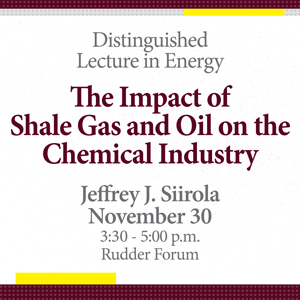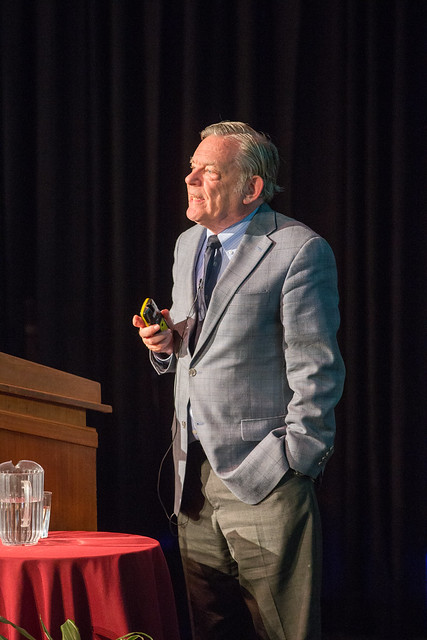
The Impact of Shale Gas and Oil on the Chemical Industry
On November 30, 2017, from 3:30 – 5:00 p.m. in the Rudder Forum, the Texas A&M Energy Institute will host a Distinguished Lecture in Energy by Dr. Jeffrey J. Siirola, a Professor of Engineering Practice in the Davidson School of Chemical Engineering at Purdue University.
Abstract
Lower alkanes and aromatics are very useful as both fuels and chemical feedstocks. Occasionally, supply disruptions constrain availability and subsequently encourage the investigation of alternative feedstocks and chemistries. Recent new technologies for the production of unconventional gas and oil from tight shale formations have significantly increased the availability of both methane and condensate. Through this, process economics have been radically altered and led an increase of new intermediates capacity through construction, as well as a multiplication of the ways traditional and alternative chemistries might be exploited.
This presentation will outline how natural gas components have historically become useful as chemical feedstocks; how government regulations have occasionally led to perturbations in availability and price; how supply crises have led to the development of alternative chemistries, catalysts, and the exploitation of shale resources; and how the increase in shale gas and oil production for energy has been having significant unexpected impacts on — and presented opportunities for — the chemical and molecular transformation industries.
Biography
Jeff Siirola retired in 2011 as a Technology Fellow at Eastman Chemical Company in Kingsport, Tennessee where he had been for more than 39 years. Having failed retirement, for six years he held half-time positions as Distinguished Service Professor of Sustainable Energy Systems at Carnegie Mellon University and Professor of Engineering Practice at Purdue University teaching process design, process synthesis, and industrial chemical technology. Starting in the Fall of 2017, he now teaches full-time at Purdue but maintains a Special Faculty position at CMU.
Siirola received a bachelor of science in chemical engineering from the University of Utah in 1967 and a Ph.D. in chemical engineering from the University of Wisconsin-Madison in 1970. His areas of interest include chemical process synthesis, computer-aided process engineering, design theory and methodology, process development and technology assessment, resource conservation and recovery, sustainable development and growth, carbon management, and chemical engineering education.
Siirola recently completed two terms as the Secretary of ABET. He is also a trustee and past president of CACHE (Computer Aids for Chemical Engineering Education), and a member of the American Chemical Society, the Association for the Advancement of Artificial Intelligence, and the American Society for Engineering Education. He has served on numerous National Research Council, National Science Foundation, and Department of Energy panels, and on the advisory boards of several journals and chemical engineering departments.
Siirola is a member of the National Academy of Engineering and was the 2005 President of the American Institute of Chemical Engineers.

